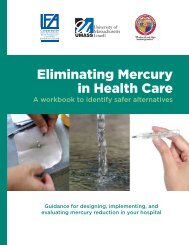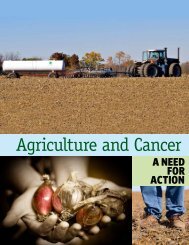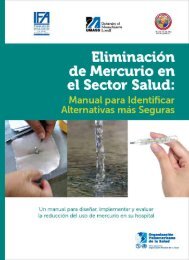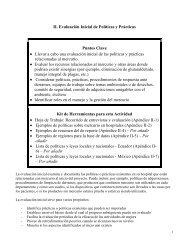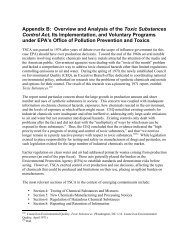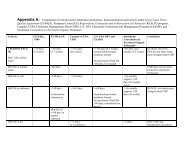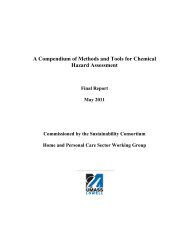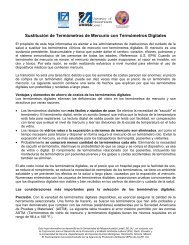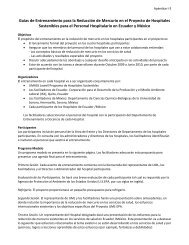Download - The Lowell Center Framework for Sustainable Products
Download - The Lowell Center Framework for Sustainable Products
Download - The Lowell Center Framework for Sustainable Products
Create successful ePaper yourself
Turn your PDF publications into a flip-book with our unique Google optimized e-Paper software.
<strong>The</strong> <strong>Lowell</strong> <strong>Center</strong> <strong>Framework</strong> <strong>for</strong> <strong>Sustainable</strong> <strong>Products</strong> | 5<br />
Driving Forces <strong>for</strong> <strong>Sustainable</strong> <strong>Products</strong><br />
Consumers choose products based on a variety<br />
of factors, including function, price, quality,<br />
aesthetics, and, increasingly, environmental<br />
and social attributes. A recent survey found<br />
that rather than “green” being a narrow niche, over 50%<br />
of consumers are changing their buying habits because of<br />
their concerns about environmental impacts of products. 1<br />
Another recent poll found that 80% of consumers believe<br />
it is important to purchase products from “green” companies<br />
and most say that they will pay the additional cost. 2<br />
A growing demand <strong>for</strong> healthy products is most evident in<br />
the food and agriculture sector. Organic foods are now big<br />
business and are available in large retail stores as well as<br />
in natural food markets. <strong>Products</strong> such as organic cotton<br />
clothing, eco-friendly school supplies, cosmetics, and “green”<br />
toys are being marketed to meet an increased demand <strong>for</strong><br />
environmentally sound products. In addition to environmental<br />
attributes in products, consumers are also looking <strong>for</strong><br />
products that have been ethically produced. Labels such as<br />
“fair trade” have been developed to respond to this demand.<br />
What are some of the <strong>for</strong>ces driving this interest in sustainable<br />
products?<br />
is a Product Necessary?<br />
In 2001, Steen Gade, the Director General of the Danish<br />
Environmental Protection Agency (EPA) asked, “I know<br />
that perfumed socks are now a possibility. <strong>The</strong> question<br />
is, are they a necessity?”<br />
What European policy makers sometimes call “necessariness”<br />
is an often overlooked attribute of a product.<br />
While there is almost no limit to the number and diversity<br />
of products on the market available to those with discretionary<br />
income, it is valuable to consider how necessary<br />
a product is be<strong>for</strong>e considering its other attributes.<br />
Unnecessary products require the use of significant<br />
resources to make, market, use, and dispose of them. An<br />
unnecessary product is not sustainable by definition, even<br />
if it may meet many of the criteria outlined in this framework.<br />
However, since the “necessariness” of a product is<br />
a subjective evaluation, it can be difficult to determine.<br />
Although “necessariness” is not included as part of the<br />
framework presented here, we encourage you to consider<br />
this attribute when developing new products.



